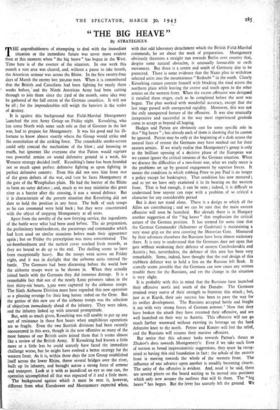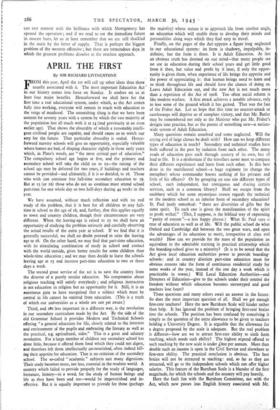"THE BIG HEAVE"
By STRATEGICUS
It is against this background that Field-Marshal Montgomery Launched the 21st Army Group on Friday night. Kesselring, who has come North with some such role as that of Groener in the last war, had to prepare for Montgomery. It was his good and his ill- fortune to know almost exactly where the Group would strike and the constitution of the striking force. The remarkable smoke-screen could only conceal the mechanism of the blow ; and knowing so much, but ignorant like everyone else that Patton would rupture two powerful armies on sound defensive ground in a week, his Western strategy decided itself. Kesselring's fame has been founded not so much upon perfect defensive fighting as upon fighting in perfect defensive country. Even this did not save him from ohe of the great defeats of the war, and here he faces Montgomery at the gate of the Westphalian plain. He had the barrier of the Rhine to form an outer defence ; and, much as we may minimise this great river as a barrier after the crossing, it was a sound defence. But it is characteristic of the present situation that Kesselring did not dare to hold the position in any force. The bulk of such troops as he can command were held back ; but they were concentrated with the object of stopping Montgomery at all costs.
Apart from the novelty of the new ferrying service, the ingredients of the battle were what had been used before. The air preparation, the preliminary bombardment, the paratroops and commandos which had been used on similar occasions before made their appearance again ; but on Friday the prescription was more concentrated. The air-bombardment and the tactical cover reached fresh records, as they are bound to do up to the end. The shelling seems to have been exceptionally heavy. But the troops went across on Friday night, and it was in daylight that the airborne units entered the battle. The Germans had been discussing before the world how the airborne troops were to be thrown in. When they actually joined battle with the Germans they did immense damage. It is a remarkable fact that out of the nearly 8,000 prisoners taken in the first thirty-six' hours, 3,500 were captured by the airborne troops. The Sixth Airborne Division must have regarded this new operation as a pleasing revenge for their long heroic ordeal on the Orne. But the genius of this new use of the airborne troops was the selection of objectives immediately ahead of the infantry. They were taken, and the infantry linked up with unusual promptitude.
But, with so much given, Kesselring was still unable to put up any sort of resistance in those first hours when amphibious operations are so fragile. Even the two Scottish divisions had been recently encountered in this area, though in the new offensive so many of the most famous of our British units joined them that it seems almost like a review of the British Army. If Kesselring had known a little more or a little less he could scarcely have faced the immediate challenge worse, but he might have evolved a better strategy for the western front. As it is, within three days the ztst Group established itself across the lower Rhine, threw several bridges over the river, built up its infantry, and brought across a strong force of armour and transport. Look at it with as jaundiced an eye as one can, the operation accomplished all that was expected of it and a little more.
The background against which it must be seen is, however, different from what Eisenhower and Montgomery expected when,
with that odd laboratory detachment which the British Field-Marshal commands, he set about the work of preparation. Montgomery obviously threatens a straight run towards Berlin over country that, despite some natural obstacles, is unusually favourable to swift movement. But there is a. centre and south of Germany also to be protected. There is some evidence that the Nazis plan to withdraw selected units into the mountainous " Redoubt " in the south. Clearly Kesselring cannot content himself with blocking the road across the northern plain while leaving the centre and south open to the other armies on the western front. When the recent offensive was designed it entailed three stages, each to be completed before the next was begun. The plan worked with wonderful accuracy, except that the last stage passed with unexpected rapidity. Moreover, this was not the only unexpected feature of the offensive. It was also unusually inexpensive and successful in the way most experienced generals come to accept as beyond all hoping.
Hodges and Patton are obviously cast for some specific role in this "big heave" ; but already each of them is showing that he cannot be ignored. Patton may be only at the beginning of a dash across the natural lines of retreat the Germans may have marked out for their eastern armies. If we wisely realise that Montgomery's group is only at the brilliant opening of a decisive phase of the European war we cannot ignore the critical tensions of the German situation. When we discuss the difficulties of a two-front war, what we really mean is the problems set up by general engagement by superior forces. It means the condition in which robbing Peter to pay Paul is no longer a policy except for bankruptcy. That condition has now matured ; and as yet we have only examined it in its bearing on the western front. That is bad enough, it can be seen ; indeed, it is difficult to understand how anyone can cope with a problem of so critical a character for any considerable period But it does not stand alone. There is a design to which all the Allies are contributing ; and we can be sure that the main eastern offensive will soon be launched. But already there is in Hungary another suggestion of the "big heave" that emphasises the critical nature of the German position. It has seemed for some time that the German Commander (Schoerner or Guderian) is maintaining a very stout grip on the area covering the Moravian Gate. Measured by their advances elsewhere the Russians have been almost stationary there. It is easy to understand that the Germans dare not open that gate without weakening their defence of eastern Czechoslovakia and Austria ; but, nevertheless, the defence of this area has been very remarkable. Some, indeed, have thought that the real design of this stubborn defence was to hold a lien on the Russian left flank. It scarcely seems possible that the Germans can now cause any serious trouble there for the Russians, and yet the change in the situation is very slight.
It is probably with this in mind that the Russians have launched their offensive north and south of the Danube. The Germans strained every ounce of their strength to frustrate this attack ; but, just as at Kursk, their sole success has been to pave the way for its swifter development. The Russians accepted battle and fought it out with very strong forces of German armour.• Now that they have broken the attack they have resumed their offensive, and are well launched on their way to Austria. This offensive will not go much farther westward without exerting its leverage on the hard defensive knot to the north. Petrov and Koniev will feel the relief, and the Russians will resume their massive offensive.
But notice that this advance looks towards Patton's thrust as Zhukov's does towards Montgomery's: Even if we take such lines of tension as broad impressionistic suggestions, they must be recog- nised as having this real foundation in fact: the whole of the eastern front is moving towards the whole of the western front. The influence of one advance upon another is steadily becoming clearer. The unity of the offensive is evident. And, need it be said, there are several pieces on the board waiting to be moved into positions which only now assume the outlines that will fit them. The "big heave" has begun. But the lever has scarcely left the ground. We
can rest content with the brilliance with which Montgomery has opened the operation ; and if we tend to see the immediate future in roseate hues, let us at least remember that we are still shackled in the main by the fetter of supply. That is perhaps the biggest problem of the western offensive ; but these are tremendous days in which the greatest problems dissolve at the resolute approach.























 Previous page
Previous page